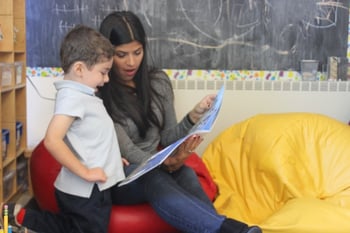Unschooling is a recent homeschooling trend in which the student leads the way in directing their learning. Instead of a traditional classroom setting, the unschooled child learns at home and during field trips. The Montessori method is a child-centered educational method where the educators encourage students to lead their own education.
On the surface, the Montessori method and unschooling share many similarities. Both seek to encourage a child's independent learning and to see the child as an individual who must learn at their own pace. Both rely on the child to lead the learning for at least part of the day. Both have been praised for their natural approaches to education and the positive teaching tactics that refrain from criticism and negative reinforcement.
Many parents wonder how unschooling compares to Montessori school and how each can help their child to prepare for the future. As the school that led the Montessori revival in the United States, here's our perspective on the major differences between these two educational methods.
5 Key Differences between Montessori and Unschooling
1. Approach to Student-Centered Learning

Both unschooling and Montessori are based around developing a passion for learning by encouraging students to pursue learning about their passions. The difference is in how those two educational philosophies implement student-centered learning.
Unschooling prides itself on being led by the student. If a subject is disliked, it may not be learned at all, or the child could end up well behind grade level expectations. There are no curricula in unschooling and no set schedules for learning. With parents in the “teacher role,” how and what children learn can vary greatly.
Montessori is also student-led, but it comes with a curriculum and teacher who guide students in choosing the style of learning that is right for them. Educators offer information, share their different perspective and then help students explore the subject themselves. This still allows for the autonomy of the child while assuring that the right information will be presented to the child and that dedicated learning times happen during the school day.
2. Opportunities to Develop Social Skills
With the Montessori method, children learn in a prepared environment and frequently work in small groups to promote social skills and cooperation. They also have the opportunity to learn from older children, and teach their knowledge to younger children in turn.
Unschooling is a homeschooling philosophy where a child may spend time learning around other children or they may primarily socialize with adults. Without structured and consistent time around other students, there is no guarantee that the child will get the opportunity to socialize with age-appropriate children or that he or she will learn the skills needed to do so.
3. Structure of the School Day
How children spend their day is one of the biggest differences between unschooling and the Montessori method. When a child is in an unschooling environment, they may not experience the kind of structure that really benefits them. Depending on a parent’s involvement, a child may have too little structured learning time, especially for subjects they don’t prefer. Since unschooling is based on encouraging children to take charge of their own academic progress, it may be more difficult for a parent to push a child to study when they have no desire to do so. In addition, if an unschooled child goes to a regular school as they get older, they may have trouble adjusting to the structure of a school day.
Much of the child's day in a Montessori school is taken up by learning time that presents a framework of workstations that they can choose between. They can go to any they like and stay as long as they choose. In addition, there is some scheduled learning time, which ensures children are exploring a variety of subjects throughout the day.
4. Training of Instructors
The Montessori method has been taught successfully in the U.S. since 1958, when Whitby led the revival of Montessori schools in Greenwich, Connecticut. Teachers undergo extensive training in student-centered education methods and learn how to give children freedom to pursue their passion while ensuring that they work on each subject.
Unschooling puts the burden of education on the parent. Even though unschooling is child-directed, parents still need to know how to guide their children and help them overcome learning challenges. Many parents unschooling their children are doing so for the first time, and may leave out an important aspect of their children's education. They also may not be as well-versed in teaching methods to be an effective instructor. The success of unschooling depends utterly on the parent-educator.
5. Proof of Success
Since Montessori learning has been around for such a long time, there has been time to collect data on test scores and college attendance. A recent look at educational statistics in Dallas has shown that children who attended Montessori schools have better graduation rates and are more likely to attend college than those who attended other local schools. Other cities such as Milwaukee and St. Louis have found that test scores were highest among those who had attended a Montessori school. Amazon founder Jeff Bezos, Google founders Larry Page and Sergey Brin and famous chef Julia Child also all cite their Montessori education as key to their success.
In contrast, unschooling is a more recent educational trend with little data on its success. Anecdotal evidence says that unschooled children can go to college if they have been diligent about their studies, but there aren’t statistics available about college acceptance and success rates.
Student-Centered Education
Even though unschooling and Montessori share many surface similarities, they give students very different educational experiences. Parents should consider the differences between each when deciding on the education they want for their children.



